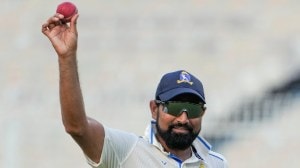Man of God
A compelling,non-partisan account of the life of Muhammed and the evolution of Islam.
Book: The First Muslim,The Story of Muhammed
Author: Lesley Hazleton.
Publisher: Atlantic Books Penguin India
Price: Rs 599
Pages: 320
A compelling,non-partisan account of the life of Muhammed and the evolution of Islam.
One must never envy biographers of the founders of faiths. With millions of believers keeping a strict watch,even presenting two sides of a story can become contentious,if not inflammatory. Reza Aslan,a scholar of religion,will vouch for this. His recent biography of Jesus Christ had Fox News suggesting that he did not have the credentials to even attempt a work on Jesus.
Lesley Hazleton is the mirror image of Aslan. She has reported from Jerusalem on the West Asian situation for many years,written for Time magazine and the New York Review of Books and is the author of several books on Jerusalem and Christianity,including the story of Mary and Jezebel. After the Prophet,her last book,switched course and went to the heart of the Shia-Sunni divide. Yet,it cannot have been an easy decision to write a book on the Prophet Muhammed the orphan,man,messenger and eventually,leader. In times when the debate is so polarised,much energy is expended,as Aslan has experienced,in simply wondering how to negotiate areas you decide you wont go into. The temptation must be to gloss over those areas or simply get overcome by one side of the argument. The First Muslim,The Story of Muhammed works mostly because it is readable and vivid. It describes events in the 7th century but it remains conscious of its 21st century audience. It never appears patronising and remains acutely conscious of the burden of all that has happened in the intervening centuries.
Hazleton has broken up the life of Muhammed into three broad sections Orphan,Exile and Leader. In each section,his life,dilemmas,events and their context are reconstructed in meticulous detail,but it never weighs the reader down. Hazletons account is more than just a political viewpoint or a commentary on the times; she makes a genuine attempt to understand the agony and troubles of an illiterate orphan dealing with the idea of being the chosen messenger of a God who is very different from the prevalent concept of the time,and the conviction that he must convey and convince fellow Arabs of the truth of the revelations.
His personal circumstances,his marriage at 25 to a respected and successful widowed businesswoman 15 years older,is one of the highlights of the book. He spends the night after Gabriel speaks to him first,shivering and unsure of the task ahead,drawing comfort in Khadijas arms. The passage reveals the humanness of the Prophet,a key aspect of Islam,and broadens the discourse about Islam and women beyond the stereotype.
Hazleton also discusses how tribalism resulted in bitter blood-feuds. Meccas deep economic inequities were taken for granted but there was a deep desire for a mediator,someone who could weld together the divided tribes and clans in Arabia. So the message Muhammed brought of egalitarianism and Islam surrender and peace or unity had tremendous resonance,despite initial opposition. Hazleton writes,Muhammeds message was far more than a personal awakening; it was an Arabian one. It called on the values and ethics that had once been the pride of Arabia,celebrating the past even as it looked to the future. It was a call for action,a spiritual call to address the social and economic problems of the time. In short,it was overtly political. And for those without power,empowering.
How Muhammeds early years impacted his life is carefully drawn out. Brought up by the Bedouin wet nurse Halima,Muhammed lived with her family for seven years,so his journey from tribal egalitarianism to the very unequal Mecca,with a deeply entrenched acceptance of the status quo,galled him. Hazleton sees even his shepherd beginnings as a parallel to the Christian nativity story.
As they embark on reading this biography,most believers will wonder is it empathetic enough? Hazleton meets controversial questions head-on with eloquence,research and an open mind,making her own allegiance,or the lack of it,irrelevant. For example,on the question of the truth of the revelations on Mount Hira,she argues that whatever happened on Mount Hira,the sheer humanness of Muhammeds reactions may be the strongest argument for its historical reality. Whether you think the words came from inside himself or from outside,it is clear that Muhammed experienced them and with a force that would shatter his sense of himself and the world.
Hazleton tackles other thorny aspects,made more prickly by the politics of our time,such as trying to understand aspects of Muslim anti-Semitism and Jewish Islamophobia through how Muhammed,while still in exile at Medina,faced off with a Jewish tribe,the Qureyz,in the year 627. She even speaks of the controversial,so-called satanic verse freely,a reference that Muhammed is said to have unwittingly made to the three daughters of God that Meccans believed in,Lat,Uzza and Manat,before quickly realising that it was Satan that had got his tongue at the time and so no reference is found to any of the three daughters in the Quran. This incident diluting,if only for a moment,the strongly monotheistic message of Islam,is bitterly contested by most Muslim scholars,and its satirical
rendition led to the fatwa against Salman Rushdie.
While the last section on Muhammed the Leader is brief,there are details of decisive battles fought and nuanced surrenders negotiated for a higher purpose. Hazleton,however,refuses to categorise Muhammed as either a prophet of peace or of war. And she is able to pull it off by talking of a complex man,carving a huge profile in history,whose vision went beyond seemingly irreconcilable opposites.
- 01
- 02
- 03
- 04
- 05






























